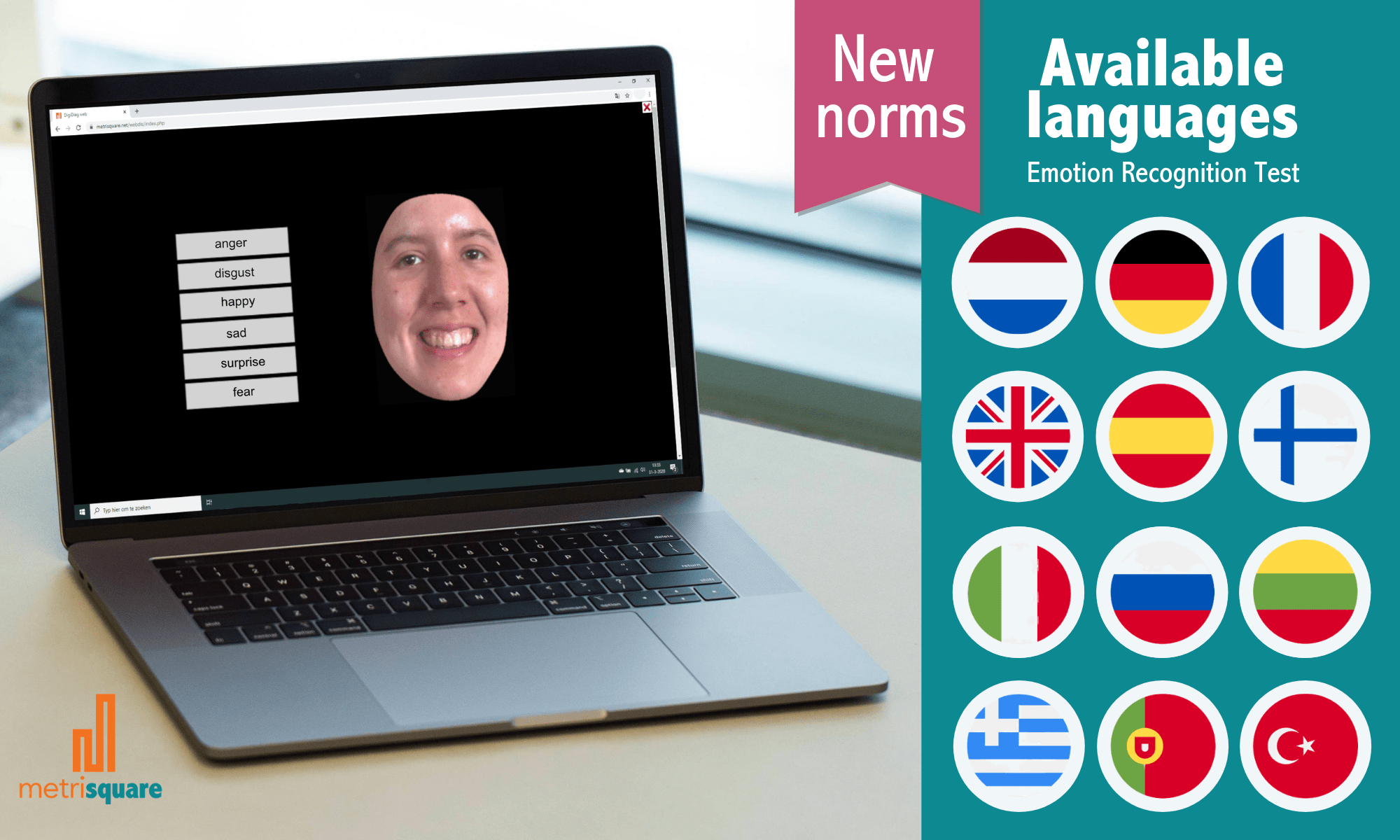ERT emotieherkenningstest
DigiDiag
Assessment of perception of morphed facial expressions using the Emotion Recognition Task (ERT): Normative data from healthy participants aged 8-75
Kessels, R.P.C., Montagne, B., Hendriks, A.W., Perrett, D.I, & De Haan, E.H.F. (2014). Journal of Neuropsychology, 8, 75-93.
https://bpspsychub.onlinelibrary.wiley.com/doi/10.1111/jnp.12009
De Emotion Recognition Task (ERT): Een test om de perceptie van emotionele gezichtsuitdrukkingen te meten
Kessels, R.P.C. & Montagne, B. (2017). Tijdschrift voor Neuropsychologie, 2, 181 – 194. Amsterdam: Boom Testuitgevers
https://www.tvnp.nl/inhoud/tijdschrift_artikel/NP-11-2-06/De-Emotion-Recognition-Task-ERT-Een-test-om-de-perceptie-van-emotionele-gezichtsuitdrukkingen-te-meten
![ERT authors [Barbara Montagne, Roy Kessels, Edward de Haan and David Perrett] group photo of the ERT authors; Barbara Montagne, Roy Kessels, Edward de Haan and David Perrett](https://www.emotieherkenningstest.nl/wp-content/uploads/2023/07/final-ERT-authors-Barbara-Montagne-Roy-Kessels-Edward-de-Haan-and-David-Perrett.png)

Emotieherkenningstest gebaseerd op wetenschappelijk onderzoek
Tijdens de Emotion Recognition Task (ERT) veranderen afbeeldingen van gezichten geleidelijk van neutraal naar een bepaalde emotie. De cliënt wordt verzocht de emotie te herkennen. De test is ontwikkeld door Barbara Montagne, Roy Kessels, David Perrett en Edward de Haan. De auteurs publiceerden de test op het Metrisquare-platform DigiDiag, en is bij wetenschappelijk gebruik gratis.
Normen op basis van regressie zijn beschikbaar uit een steekproef van 418 gezonde deelnemers uit Nederland, Ierland, Duitsland en Australië van 8-88 jaar. Sinds 2020 zijn er nieuwe normen beschikbaar (Updated normative data 2020 18-88 (n=255))
Gegevens van individuele deelnemers worden voor onderzoeksdoeleinden op het niveau van elke proef opgeslagen. Ook wordt er een geaggregeerd PDF-rapport per persoon gegenereerd, waarin de prestatie van het individu als percentiel voor elke emotie wordt weergegeven, evenals de totale score. De ERT is beschikbaar in het Nederlands, Engels, Duits, Frans, Spaans, Italiaans, Portugees, Turks, Fins, Litouws en Russisch. Via de test kan gemakkelijk een andere taal worden gekozen. Wil je de test graag in een andere taal verkrijgen? Neem dan contact met ons op.
De ERT is een gratis test, je betaalt enkel voor het platform en de aansluitkosten. Als je kiest voor de klinische versie, kun je gebruik maken van onze services die ervoor zorgen dat het instrument veilig kan worden gebruikt voor klinische doeleinden in een zorginstelling.
ERT for Research on Dementia
Metrisquare has partnered with the Centre for Healthy Brain Ageing (CHeBA) at University of New South Wales Sydney in Australia to deliver an online tool to assess social cognition.
Even though social cognition is often affected in dementia, it is less well understood than memory and executive function. There are expected age-related changes in social cognition in healthy and cognitively normal older adults but the extent to which this varies is not clear.
Work at CHeBA seeks to ascertain what can be considered normative social cognitive functioning in older adults, what changes are attributable to normal age-related changes, and if early changes in social cognitive function can serve as a marker of cognitive decline and predict future onset of dementia. By assessing social cognition in older Australian twins, researchers at CHeBA will also examine the extent to which social cognition and changes in social cognition are determined by genetics and our environment.
Social perception, which is the gathering and detection of social cues from one’s environment to assess a situation, is a subdomain of social cognition. The most salient example of this is emotion recognition, particularly through facial expressions and tone of voice.
While dementia is associated with outright impairments in correctly identifying certain facial expressions of emotions, it is likely that this impairment has a gradual onset, and that milder forms of cognitive impairment is associated with slight impairments in recognizing emotions at an incremental level.
For this reason, CHeBA decided to use the Emotion Recognition Task (ERT) hosted on the Metrisquare platform to quantify this skill. The ERT assesses participants on their accuracy in identifying the six basic emotions (anger, fear, disgust, happiness, sadness, surprise) at various intensities (20%, 40%, 60%, 80%, 100%) and allows the researchers to better map out more subtle differences and changes in emotion recognition ability. The ERT has been validated in numerous other clinical groups, including autism spectrum disorders, frontotemporal dementia, and Alzheimer’s disease.
CHeBA’s vision is to achieve, through research, healthier brain ageing and better clinical care of age-related brain diseases. Metrisquare is proud to partner with them in this endeavour.

Text written and approved by: (left) Vibeke Catts, Study Coordinator Older Australian Twins Study (OATS) and (right) Russell Chander, Scientia PhD Scholar, at CHeBA, UNSW Sydney.
Neem contact op via onderstaand formulier
Metrisquare biedt ook digitale scoringsmogelijkheden voor paper-and-pencil tests via RSP.
Snel en concreet digitaal psychologische tests afnemen via DigiDiag.

